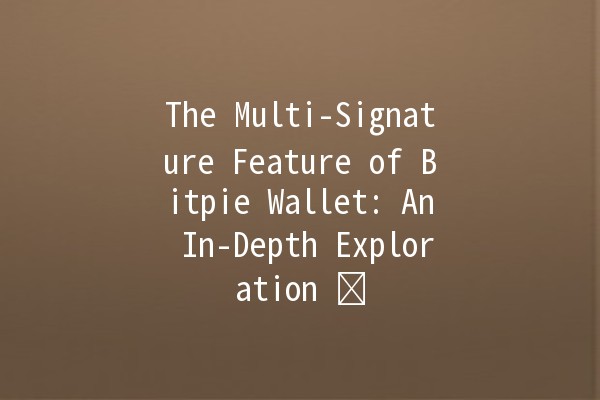




Bitpie Wallet, a leading cryptocurrency wallet, has gained significant attention for its robust security features and userfriendly interface. Among its many functionalities, the multisignature (multisig) feature stands out as a critical tool for enhancing security in cryptocurrency transactions. This article will provide a comprehensive overview of Bitpie Wallet’s multisignature functionality, detailing its benefits, how it works, and practical applications.
Multisignature, or multisig, is a security mechanism that requires multiple keys to authorize a Bitcoin transaction. In simpler terms, instead of having a single private key that grants access to the wallet, a multisignature wallet requires two or more private keys to complete a transaction. This feature is particularly useful for minimizing the risk of unauthorized access and ensuring that collaborative management of funds is secure.

In the realm of cryptocurrency, security is paramount. The decentralized nature of cryptocurrencies makes them attractive targets for hackers and fraudsters. Multisig wallets add an extra layer of protection, which is crucial for individual users and businesses alike. Some key reasons why multisignature is important include:
Enhanced Security: With multiple keys required, the chances of a single point of failure are reduced. This means that even if one key is compromised, the funds cannot be accessed without the other keys.
Shared Control: Multisig wallets are ideal for organizations where multiple individuals need to oversee transactions. It allows for joint decisionmaking and accountability.
Fraud Prevention: Multisignature wallets can help to prevent unauthorized transactions by ensuring that no single person can unilaterally access the wallet.
To activate the multisignature feature on Bitpie Wallet, users can follow these steps:
Description: Having a defined process for how transactions are approved can help streamline operations.
Example: Create a checklist for coowners to follow that specifies the steps required before a transaction is made, ensuring clarity and preventing miscommunication.
Description: Businesses can leverage the multisig feature for managing company funds.
Example: Set up a 3of5 multisig wallet for company expenses, ensuring that at least three executives must sign off on large transactions.
Description: Providing training on best security practices can minimize risk.
Example: Host workshops to teach coowners about phishing scams, proper key management, and recognizing suspicious activity.
Description: Frequent reviews help in identifying potential vulnerabilities.
Example: Schedule monthly meetings to revisit the wallet's security configurations, ensuring they are updated to reflect any changes in user roles or company policies.
Description: Setting up alerts for transaction requests can keep all users informed.
Example: Implement email or push notifications that alert coowners whenever there is a transaction request, ensuring everyone is kept in the loop.
Answer: Bitpie allows users to set up wallets with a maximum of 15 signatures. This enables significant flexibility in managing who has access to the wallet and how many approvals are required for a transaction. Businesses might prefer a higher signature count for greater oversight, while individual users may opt for fewer to simplify the process.
Answer: Yes, users can modify the number of required signatures in the wallet settings. However, changes may require reconfiguring the wallet and notifying all coowners, especially if the total number of keys or the coowners has changed.
Answer: If a coowner loses their private key, it could significantly impact the ability to access the wallet, particularly if the lost key is necessary for transactions. However, with a carefully configured multisig setup, as long as the required number of keys remains functional, the wallet can still operate normally.
Answer: Multisignature wallets mitigate hacking risks by preventing unauthorized access. Even if a hacker gains access to one private key, they still need the other keys to execute a transaction. This adds an important layer of security against potential breaches.
Answer: Bitpie does not charge additional fees specifically for multisignature transactions. However, typical blockchain transaction fees still apply, which vary based on network congestion and the amount of data being processed.
Answer: Yes, users can operate both multisignature and traditional wallets within Bitpie Wallet. This flexibility allows for tailored financial management strategies where certain funds may be kept more securely than others, depending on their intended use.
The multisignature feature of Bitpie Wallet presents an innovative approach to securing cryptocurrencies, offering heightened security and collaborative management capabilities. By implementing clear protocols, educating coowners, and regularly reviewing security measures, users can optimize their use of multisignature functionality, ultimately protecting their digital assets more efficiently.
If you’re looking to enhance the security of your cryptocurrency holdings, setting up a multisigned wallet on Bitpie could be a significant advantage. Explore this feature today to ensure your assets are safeguarded while promoting responsible management among your coowners.
Bitpie Wallet
Multisignature
Cryptocurrency security
Multisig wallet
Collaborative money management
By following these strategies and making full use of the multisignature capabilities, users can greatly enhance their cryptocurrency transaction experience while ensuring their assets remain secure and accountable.